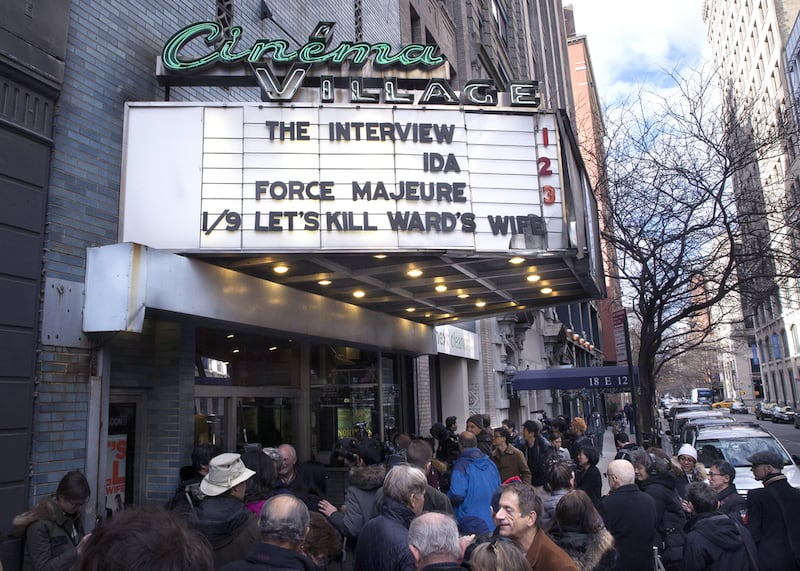The Interview was never supposed to be a paradigm-shifting film. But unusual doesn't even begin to describe the series of events that transpired over the past month, culminating in the unprecedented move by a major studio to release a film in theatres and on digital platforms simultaneously.
The film is, as everyone knows by now, a comedy about a fictional plot to assassinate the not-at-all-fictional North Korean leader Kim Jong-un. It was pulled from its planned release last month in the aftermath of the Sony hacking scandal, which some have blamed on North Korea, amid threats of attacks on cinemas that screened it.
Sony is in uncharted waters with the film. They gave it a limited release on 331 screens in North America at Christmas, from which it earned US$2.8 million (Dh10.3m) over the holiday weekend.
However, that paled in comparison to the $15m it made in online video-on-demand sales, which made it the studio’s most successful online film ever.
"Considering the incredibly challenging circumstances, we are extremely grateful to the people all over the country who came out to experience The Interview," says Rory Bruer, the president of worldwide distribution for Sony Pictures.
For a film that probably would have come and gone in the usual 3,000 cinemas in the United States with little fanfare, the $40m comedy has now become an accidental case study in the world of day-and-date releases, in which titles are available in cinemas and for digital rental simultaneously.
The industry has been watching closely to see just where audiences would choose to pay their money in the last couple of weeks.
The big question is whether or not this strategy could be viable for other major releases.
While a $3,142 per-theatre average and sold-out showings when audiences had the option to watch the film from the comfort of their own homes is nothing to scoff at, analysts agree that it probably doesn’t signal the beginning of a significant change in how Hollywood does business.
Day-and-date releases are nothing new, for one. Independent distributors have embraced this strategy for years. But those are generally small-scale films with relatively tiny budgets, that can’t afford a more traditional, widespread marketing campaign.
For major studios, it’s never really been an option.
Cinema chains depend on exclusive first-run content to survive. If audiences were given the choice to rent anything from a mid-budget comedy to a $200m blockbuster on the day of its release, cinema chains would undoubtedly suffer.
"The last thing the major theatre chains want is for this kind of strategy to be employed by the major studios on a more frequent basis," says the BoxOfficeGuru.com editor Gitesh Pandya.
Last year, Warner Bros experimented with an unconventional day-and-date release for the crowd-funded movie Veronica Mars. The theatre chains Regal and Cinemark declined to screen the film because of its online availability. The film ended up showing on only 270 screens.
“The relationship between big studios and exhibitors is so monumental that they’re not going to start changing things around anytime soon. Possibly down the road, little by little – but the old-school model of putting your major releases in 3,000 theatres nationwide will stay intact for the time being,” Pandya says.
Paul Dergarabedian, a senior media analyst for the box-office tracker Rentrak, agrees.
“Theatrical is the engine that drives everything else. I don’t think this is a sudden gateway to studios wanting to release films this way,” he says.
Also, The Interview is an imperfect case. Patriotism, free speech, pure curiosity and even the desire to be part of the nationwide conversation have all played a part in why audiences flocked to theatres on Christmas Day to see the movie.
"Awareness is through the roof," Dergarabedian said. "People went out to the theatres and made an event out of it. They're going to be talking about this for a long time. That's a very interesting and unusual phenomenon that's usually reserved for films such as The Hobbit or Star Wars."
Pandya says: “Audiences who would otherwise never go to see a Seth Rogen movie were hearing about it and decided to come out to see what all the fuss was about.”
Long-term prospects for The Interview at the box office remain uncertain. "The movie is mediocre," Pandya says. "If it were a brilliant film, the word of mouth would carry it week to week."
The Interview might now forever be in the history books, but it probably won't change the way audiences see new movies. For the big movies, theatrical release will always come first, Dergarabedian reckons.
“It’s a system that works and audiences like it,” he says.
artslife@thenational.ae





